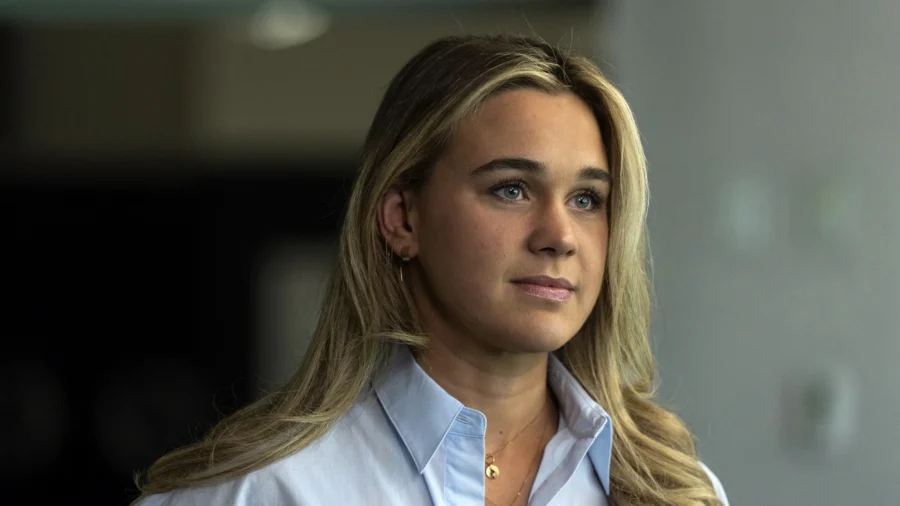The first step for swimmer Ali Truwit was overcoming her newfound fear of the one place she had always felt safe—the water.
Because the sound of water, any sound involving water, instantly triggered flashbacks to the day she swam for her life after being bitten by a shark.
She and a friend were snorkeling in the ocean off Turks and Caicos on May 24, 2023, when a shark charged and bit Truwit’s lower left leg. Bleeding and with the shark circling, Truwit went into competitive swim mode and raced 75 yards toward the safety of the boat. Truwit was rushed to the hospital and airlifted to the United States, where she had three surgeries, including one to amputate her leg below the knee.
To reclaim her love of the water, she went to the family’s backyard pool. She waded up to her waist, fought off fear, and took back control. The plunge not only started her path toward healing but to Paris for the Paralympics.
“I love comeback stories,” said the 24-year-old from Darien, Connecticut, who qualified for Paris in the 100 free, 400 free, and the 100 back. “I’ve definitely relied on other people’s comeback stories to help me hold on to what feels like a bold and unrealistic hope—of fighting off a shark and surviving and losing a limb and making the Paralympics all in a year.”
The Shark Attack
Her itinerary for that summer involved fun and adventure before starting work at a consulting firm.
Truwit had just graduated from Yale after a career in the pool in which she was a four-year letter winner. She kicked things off by running a marathon with her mom on Mother’s Day.
Next on the list: joining friends for some sun on the beaches in Turks and Caicos. She went snorkeling with Yale teammate and good friend Sophie Pilkinton in an area not known for sharks.
On their way back to the boat, a shark aggressively approached and began bumping them.
“We tried to fight back,” Truwit said.
What was believed to be a bull shark bit her on the foot and lower leg.
“My immediate thought was, ‘Am I crazy or do I not have a foot right now?’” Truwit said. “It was a really hard image for me. But you move immediately into action.”
Stay calm. Remain conscious. Just get to the boat. That’s all she focused on as she and Pilkinton sprinted through the water, intensely aware the shark was still there.
Once on the boat, Pilkinton applied a tourniquet to slow the bleeding.
Truwit was later airlifted to a trauma hospital in Miami for two surgeries to fight infections. She was transported to a hospital in New York, where on her 23rd birthday, she underwent a transtibial—below-the-knee—amputation.
“A lot of dark days,” she said. “But I’m alive and I almost wasn’t.”
‘Work Works’ Becomes the Mantra for Recovery
The Truwit family has a mantra—“Work works.” That’s why Truwit went to rehab even on days when she didn’t feel good or was sad.
“Just put in the work,” she said.
First, though, she needed to alter her “Why?”
Instead of, “Why did this happen to me?” she centered on, “Why not throw everything into something?”
More specifically, why not the Paralympics? After all, she had plenty of time to get ready for the 2028 Summer Paralympics in Los Angeles.
“But I’m not someone who waits,” she said.
So Paris in 2024 it was, even if the time frame was incredibly tight.
She went through prosthetic training and strength exercises. She also worked with trauma therapists, which led to narrative therapy to re-author her life and combat her nightmares.
“So that I don’t let fear rule my life,” Truwit explained. “I had lost enough and anything that was on the table for me to regain, I was going to fight to regain it.
“I didn’t want to lose a limb and my love of the water, too.”
Making Team USA for Paris
About 3.5 months removed from the attack, she was competing again. It was early but necessary to make certain standards to be in contention for a Paralympic spot. To help her, she teamed up with her club coach, Jamie Barone.
“I was just really curious how I was going to feel being back on the pool deck and back in a competitive space,” Truwit said. “The more I worked at it, the flashbacks reduced and the pain lessened.”
She qualified for nationals in Orlando, Florida, where she swam freestyle and backstroke. In April, she attended an international meet in Portugal—her first trip out of the country since the shark attack. Her mom was there as she shined in the 400 free S10 category, in which swimmers have a physical impairment affecting one of their joints.
“She’s just basically a workhorse who refuses to give up,” said her mom, Jody. “That’s who she was before the attack and amputation and that’s who she is every single day now.”
At U.S. Paralympic trials in Minneapolis in late June, she won the 100 backstroke, 400 free, and 100 free. She joins a team that includes Paralympic swimming great Jessica Long and a host of returning medalists from Tokyo.
“I think hearing my name on that team was just a reminder to me that I’m stronger than I think,” said Truwit, who launched the “Stronger Than You Think” foundation to help others navigate through the healing process. “That we’re all stronger than we think.”
In Paris, she will have the support of about 50 family members and friends.
“A year ago, I was just working to get back in the water,” Truwit said. “I now get back in the water and that sense of joy comes back, and the smile comes back. To have that again is something I’m so thankful for. Honestly, it’s one of the moments in my swim career that I’m the proudest of, because I know how much work it took.”
By Pat Graham

